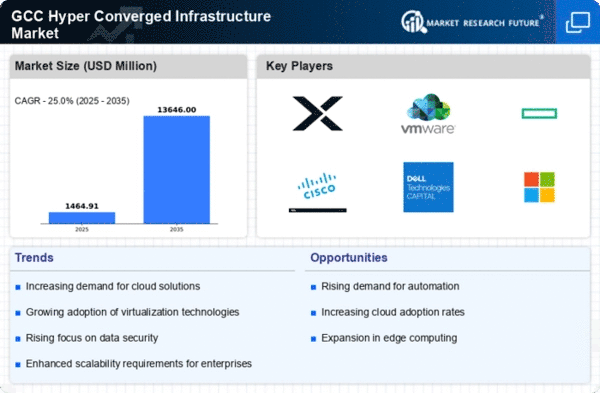Enhanced Data Security Requirements
In the hyper converged-infrastructure market, the emphasis on data security is intensifying, particularly in the GCC region. With increasing cyber threats and stringent regulatory requirements, organizations are prioritizing solutions that offer robust security features. This includes integrated security protocols and compliance with local data protection laws. The market is responding to this demand by incorporating advanced security measures into hyper converged systems, which not only protect sensitive information but also enhance overall operational resilience. As a result, businesses are more inclined to invest in hyper converged solutions that provide comprehensive security, thereby driving market growth.
Focus on Sustainability Initiatives
Sustainability is becoming a pivotal concern in the hyper converged-infrastructure market, particularly within the GCC. Organizations are increasingly prioritizing eco-friendly solutions that minimize energy consumption and reduce carbon footprints. Hyper converged systems, known for their efficient resource utilization, align well with these sustainability goals. As businesses strive to meet regulatory requirements and corporate social responsibility objectives, the demand for energy-efficient hyper converged solutions is likely to rise. This trend is expected to contribute to a market growth rate of approximately 15% as companies seek to balance operational efficiency with environmental stewardship.
Shift Towards Remote Work Solutions
The hyper converged-infrastructure market is witnessing a shift towards remote work solutions, which is reshaping IT infrastructure needs in the GCC. As organizations adapt to flexible work arrangements, there is a growing requirement for infrastructure that supports remote access and collaboration. Hyper converged systems, with their centralized management and ease of deployment, are well-suited to meet these demands. This trend is reflected in the increasing adoption rates of hyper converged solutions, which are expected to rise by over 30% in the coming years. The ability to provide secure and efficient remote work environments is becoming a key driver for organizations looking to enhance productivity and maintain business continuity.
Rising Demand for Scalable Solutions
The hyper converged-infrastructure market is experiencing a notable surge in demand for scalable solutions across various sectors in the GCC. Organizations are increasingly seeking infrastructure that can grow alongside their business needs, allowing for seamless expansion without significant upfront investments. This trend is particularly evident in industries such as finance and healthcare, where agility and scalability are paramount. According to recent data, the market is projected to grow at a CAGR of approximately 25% over the next five years, driven by the need for flexible IT environments. As businesses in the GCC continue to embrace digital transformation, the hyper converged-infrastructure market is likely to play a crucial role in facilitating this growth.
Integration of Artificial Intelligence
The integration of artificial intelligence (AI) into the hyper converged-infrastructure market is emerging as a transformative driver in the GCC. AI technologies are being utilized to optimize resource allocation, enhance performance monitoring, and automate routine tasks within hyper converged systems. This not only improves operational efficiency but also reduces the need for extensive manual intervention. As organizations increasingly recognize the potential of AI to streamline their IT operations, the demand for hyper converged solutions that incorporate these technologies is likely to grow. The market is expected to see a significant uptick in AI-enabled hyper converged systems, potentially increasing market share by 20% over the next few years.















